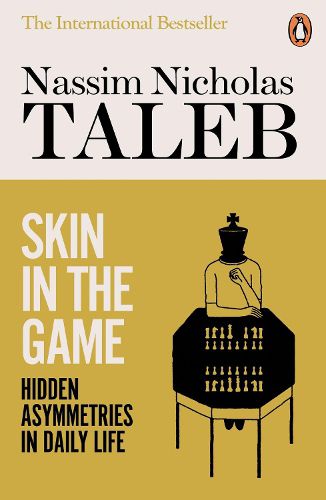Readings Newsletter
Become a Readings Member to make your shopping experience even easier.
Sign in or sign up for free!
You’re not far away from qualifying for FREE standard shipping within Australia
You’ve qualified for FREE standard shipping within Australia
The cart is loading…






A great iconoclast… Taleb, a Wall Street trader turned essayist, is a thinker touched by genius Matthew Syed, author of Black Box Thinking
Why should we never listen to people who explain rather than do? Why do companies go bust? How is it that we have more slaves today than in Roman times? Why does imposing democracy on other countries never work?
The answer- too many people running the world don’t have skin in the game. In this provocative book, Nassim Nicholas Taleb shows that skin in the game applies to all aspects of our lives. It’s about having something to lose and taking a risk. Citizens, lab experimenters, artisans, political activists and hedge fund traders all have skin in the game. Policy wonks, corporate executives, theoreticians, bankers and most journalists don’t.
In his inimitable, pugnacious style, Taleb creates a jaw-dropping framework for understanding this idea. Skin in the Game challenges our long-held beliefs about risk, reward, politics, religion and finance - and makes us rethink everything we thought we knew.
$9.00 standard shipping within Australia
FREE standard shipping within Australia for orders over $100.00
Express & International shipping calculated at checkout
Stock availability can be subject to change without notice. We recommend calling the shop or contacting our online team to check availability of low stock items. Please see our Shopping Online page for more details.
A great iconoclast… Taleb, a Wall Street trader turned essayist, is a thinker touched by genius Matthew Syed, author of Black Box Thinking
Why should we never listen to people who explain rather than do? Why do companies go bust? How is it that we have more slaves today than in Roman times? Why does imposing democracy on other countries never work?
The answer- too many people running the world don’t have skin in the game. In this provocative book, Nassim Nicholas Taleb shows that skin in the game applies to all aspects of our lives. It’s about having something to lose and taking a risk. Citizens, lab experimenters, artisans, political activists and hedge fund traders all have skin in the game. Policy wonks, corporate executives, theoreticians, bankers and most journalists don’t.
In his inimitable, pugnacious style, Taleb creates a jaw-dropping framework for understanding this idea. Skin in the Game challenges our long-held beliefs about risk, reward, politics, religion and finance - and makes us rethink everything we thought we knew.
Sonya Voumard’s father was a ‘member of Melbourne journalism’s gregarious tribe’. At ten years old, when she was fascinated and spooked by stories of child abductions, her father laid out three newspapers on the kitchen table and they ‘talked headlines, layout and background paragraphs’. Aged thirteen, she was the subject of a scandalous profile about Melbourne teenagers written by ‘Jenny’ (Jennifer) Byrne. And when she finished high school, her godfather, the then director of news at Channel Seven, helped her get a cadetship.
This intriguing, eclectic book is both personal history and investigation into the endangered world of newspaper journalism. Her early immersion in the tribe, and her years as a cadet, press gallery journalist, Queensland correspondent and freelance feature writer stand out as discrete narrative strands that come together to explore the changing art and practice of journalism.
In the book’s most intriguing section, Voumard revisits a (never published) interview she did with Helen Garner for a university assignment: she follows up with Garner decades later, and persuades her to work with her on a collaborative, Paris Review style interview for Meanjin. By taking us inside the process of working with Garner, Voumard generously offers the reader layer upon layer of insight. The section on being interviewed by ‘Jenny’ is similarly fascinating, as Voumard the journalist belatedly turns the perspective back onto the now-renowned interviewer, whose immediate intimacy seduced Voumard’s teenage self into giving more than she meant to (as journalists do). Other particularly pertinent threads in the current climate are Voumard’s accounts of the blatant sexual harassment that was once endured as part of the job, and her sketch of the rampantly bed-hopping Canberra press gallery/political scene.
Skin in the Game would be a great read for any aspiring journalist, and has much to offer any reader interested in how stories are made.